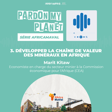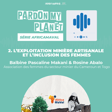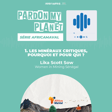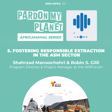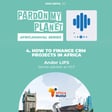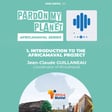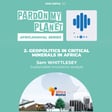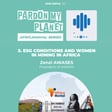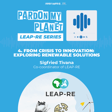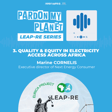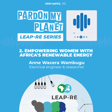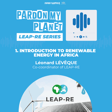Introduction to Sustainable Mining
00:00:10
Speaker
Hello and welcome to Pardon My Planet podcast. I'm Angela, the host, and today we dive into the mineral exploration and sustainable mining. The term mining generally brings a lot of negative imagery. It's often environmental damage, pollution, and impacts on local communities, for example.
00:00:30
Speaker
Yet, as we've seen in previous episodes of Pardon My Planet, critical raw materials are vital in every aspect of our modern lives. They power solar panels and wind turbines, are at the core of smartphone and electric vehicles, and even play a role in medical technologies like ah mr MRI machines and lithium batteries used in mental health treatments.
00:00:54
Speaker
And that's just a few examples. So how do we meet this growing demand while ensuring mining is more responsible and sustainable? To explore
Complexity of Mineral Exploitation
00:01:05
Speaker
this question, we are joined by Jamie Newell, CEO of Quest Critical Metals and involved in the EIS,
00:01:12
Speaker
an EU-funded project focused on making mineral exploration more precise and less disruptive, and Stéphane Bour, President of Promissure, an association promoting innovation in mineral processing and extractive metallurgy. Stéphane is also involved in Screen3, a Horizon Europe project working to strengthen Europe's critical raw material strategy. Hello, Jamie and Stéphane, and welcome.
00:01:37
Speaker
Good morning. Hello. So first, I want to address something that happened during the preparation of this episode. I mentioned the term mineral exploitation, which made you immediately react, especially you, Stefan. When talking about mining, it's a term that we do hear quite a lot. So why did it make you react, Stefan?
Exploration vs. Mining Misconceptions
00:02:02
Speaker
it made me react because um um the extracting activity or the mining activity is a very complex activity. And when we only say exploitation, um very often do people understand here the negative aspects of the mining, in particular the the bad workers' condition in some countries, mainly in the past, it's improving, but very often this is what we what we understand with this exploitation. The extractive activity is a very complex one with different steps that takes a long time,
00:02:38
Speaker
And that needs much more a precise words to explain this, like the ah geological understanding of the Earth, the exploration phase, the production phase, the refining of the metals, before we can use them in the technologies you mentioned before.
00:02:55
Speaker
Okay, thank you. And talking about exploration, ah exploration process plays a crucial role in the identifying and the assessing assessing resources. So how can we ensure ah that we move away from ah this ah negative ah imagery and then make sure that this exploration is ah smarter and more sustainable from ah the beginning. ah Jamie, how do we make sure that we make minimal environmental disruption? um Yeah, I think it's a really good question. i mean There's obviously ah many things that happened before there's any invasive exploration. I think one of the big issues is the perception of what exploration is.
Innovations in Exploration Technology
00:03:40
Speaker
The first phases of exploration are often geological mapping, which is has no invasive issues. It is ah geochemistry taking very small soil samples. And then geophysics, again, which although um involves often either from the air on the ground using electric currents and other techniques to look into the ground, there's no invasive nature.
00:04:02
Speaker
that the key invasive issue in exploration is when when you drill because obviously um although ah mineral exploration drilling it doesn't involve the sort of giant drilling rigs people people perceive perhaps in in old drilling it's still an an invasive quality and therefore if you're using um ideas such as the exploration information systems project that's software that we've been developing which is basically software to try and use data analysis and AI to identify prospective areas. That means that when you you drill less and when you drill it is more effective and efficient um and and and there's less invasive exploration. But again, I think the biggest issue for me is that for a generation, people in the EU haven't seen mineral exploration
00:04:50
Speaker
And I think they assume it to be the same have the same impact of mining, and and it just isn't. And for every 1,000 exploration projects, you're you're lucky if you get one mine, it's probably more like 10,000 to one. So I think there's the perception issue, and there's also the technical things we can do to reduce the invasive bit of exploration, um so i.e. the drilling area. For example? For example, the software that EIS use, a better use of geophysics, and better use of geochemistry, and and and just I said the main thing, I think it's education as well. I'll explain to the the EU public that not just the benefits, but actually the fact that just because someone is doing an exploration drilling in your area doesn't mean there's going to be a mine. It's highly unlikely, but we're trying to understand what's going on beneath the ah surface. and That's always tricky. and the so ah That tool is ah already available.
00:05:45
Speaker
So yes, the the the software tool I mentioned, the exploration information software tool and that we're developing through the EU grant funded project is available. It is on GitHub, for example. It is an open source bit of software um allowing not only people to use it for free, but also to help work on
Responsible Mining Practices
00:06:03
Speaker
it for free. And we announced at the European Rural Materials Week in December in Brussels, the first test run of the software, which was tested in our our exploration project on the Czech-German border, and the first test was very successful in identifying prospective areas. and The reason we know it's successful is we didn't deliberately input, for example, our geophysical data into the software because we'd we'd identified a very large anomaly that needed exploring, yet the software discovered this anomaly without the bit of data that would make it easy. um So it's very, very exciting
00:06:37
Speaker
um for the software development and we'll be further testing it's also identified a completely new area we hadn't even considered and as part of the project we'll be doing some geochemical testing on that area in the spring of this year and if that proves to be successful we would have proved that the software works and I think it's very exciting for all parties concerned to be part of a EU grant funded project that delivers something that has real practical application for exploration for critical minerals in the EU and will deliver what we want, i.e. you know better exploration, more targeted exploration and less invasive exploration.
00:07:17
Speaker
And so this is part of what we say about responsible mining, right? It's a term that we hear a lot. Do you have a reaction about this term, responsible mining? Well, first of all, it's not mining. We're exploring. And again i we go back to that point of public perception. um Expiration is not mining. and It takes probably 10,000 exploration projects to produce one mine. But certainly, I think Unfortunately, a lot of the the non-state players in the sector, the NGOs, the environmental groups, um still have a view of mining, of how it used, an exploration of how it used to be conducted. And I think when you understand the modern techniques that we use in exploration,
00:08:02
Speaker
that are used again in mining, although that's not what we do, we explore. I think hence this point of re-education of people, it there is and we work extremely hard to protect the environment. We know we understand the importance of engaging in the local community, we understand the importance of of not disrupting the local community, of not damaging the environment, anything in the environment, because We need all need to exist together and and the the modern techniques allow us to do this. Yes, there was always a point in exploration where you were going to drill into the ground, but we do it less and we do it more effectively. What do you think about this,
Advanced Techniques in Modern Exploration
00:08:38
Speaker
Stefan? As Jamie said, not all the exploration will ah lead to a mine. However, it's it's a key activity. The exploration today with the modern techniques that Jamie mentioned ah is very important and
00:08:53
Speaker
will and is contributing today to what we can call the responsible mining. ah In the past or centuries ago, ah you made a hole and the the hole was big and bigger and bigger. And when you found the ore, you you you use it. And when there was nothing, it was a lot of waste. Now with with the exploration, with the 3D visualization of the body of the ore, with the techniques that that were mentioned that allow today to understand you the underground
00:09:24
Speaker
ah with the depths higher than several ah several hundred of meters, then when you start the mining activity, you can go very precisely where ah you have the higher probabilities to find the richest ore. So the exploration is really the first part of the responsible mining and the people have to understand that without this, they will not have the twin transitions we want that you mentioned at the beginning. So we need the exploration. We need an in-depth exploration with the modern techniques in order the later on when ah the probability is good, when the oil is excellent, when the the mining will be very efficient. Then we go to a mine and we have the metals we need.
00:10:18
Speaker
and Once we've done this more responsible exploration, what can we envision for the next steps to start the actual mining? The mining the mining activity is a long-term activity. It needs more than 15 years to open a mine from the first exploration to the first production of raw materials.
Investment Challenges in Sustainable Mining
00:10:44
Speaker
As I said before,
00:10:45
Speaker
ah the better the exploration than at the end, the more efficient the extraction. However, depending on the countries, the process to open a mind ah requires a lot of steps that are of course compulsory since some of them address ah the reduction of the environmental and social ah impacts of the activity. So it's very important to go through these different steps in depth with the communities, the public, people living around, and the local authorities. This takes time, but this is the key of the success of a mining activity. And last but not least, you need investors.
00:11:40
Speaker
And this is always very difficult to find investors in the mining activity, because if you can predict your cost, your production cost, it's very difficult, not to say impossible, to predict the price of the metal on the international markets. And depending on the metals also, these prices are very volatile that can sometimes impeach the the investors to come and allow the activity, even if the mining site is perfect, even if all the conditions around are great, and even if we made everything to reduce the environmental impacts. And today, reducing these environmental impacts, of course, ah it has a cost. It has a cost in the production.
00:12:39
Speaker
that to ah has to be considered in the international market of the raw materials. And this is also very difficult because some countries today do not follow the same level of requirements that we in particular in Europe want to use.
00:13:01
Speaker
Yeah, I think he made some very good points. I think the point I'd like to pick up is the point he made about investment and the problem of the volatility of metal pricing. Our project on the Czech German border is a predominantly copper cobalt hosting, what we call a VMS, volcanic mass of sulphide, a multi metallic deposit.
00:13:23
Speaker
and which we're ready to raise money to explore that. Now, the problem is that the the gold price, for example, has gone up extremely highly, and um but the copper price has stayed low, as has the cobalt price.
00:13:37
Speaker
The EU does not need more gold, but the EU does need copper and cobalt. yeah Now right now because of the crazy um sort of the way that our project would be valued, even though we have a tiny amount of gold that is of more interest than the large amount of copper and cobalt we might have, yet it's the copper and cobalt that the EU need.
00:13:59
Speaker
And the yes, the the price is low now in copper and cobalt, but the market's predicting a shortage in even a shorter time period is 12 months to 18 months. Yet because investors have a very short term
Circular Economy in Mining
00:14:12
Speaker
time horizon, they're looking at, well, what where can we make money now? Or we can make money investing in gold exploration. And that's really what he once I want to comment on.
00:14:21
Speaker
It's very important to understand that this shortage is not a lack of resources or a lack of reserves of copper in the underground. It's just a question of investment and the price we are ready to pay for a sustainable production of copper.
00:14:41
Speaker
It's also the same for other metals. And for sure, in the future, we will have less and less copper at 8 euros per kilo. However, we have plenty of copper at 30 euros per kilo. And do we have ah to understand that a sustainable production, a responsible production of A metal, anyway, a sustainable industrial activity is more expensive than what is done in some countries. And without this, we will not be able ah to progress in in in in the EU in our ah independence in the raw material production.
00:15:26
Speaker
And so from what I understand of what you are saying, it's also a choice, a conscious choice that we are making in that case. Of course, of course it's it's a choice and very often this ah um this could be ah addressed with ah some innovative approaches of some business models.
00:15:49
Speaker
um for for For the people that had the very beginning of the value chain, you say the upstream of the value chain, ah if your primary copper is 20% more expensive, your business will be very difficult. However, at the end, when you have a few grams of copper in a technology, the impact of the primary of the cost of the primary copper could be less impacting.
00:16:18
Speaker
So we we could address this by an integration of the value chain, by accepting that the people that will produce the product for the society will take their part in contributing to a sustainable production of the primary raw materials. And only with this we could develop a new industry in Europe.
00:16:45
Speaker
And does ah circular economy has a role to play
Balancing Extraction and Recycling
00:16:51
Speaker
in this? It depends what you call a circular economy for many people. Circular economy is ah recycling.
00:16:59
Speaker
Circular economy is not only recycling. Circular economy is a global approach of the economy. it's Circular economy is not circular, raw materials. So the circular economy is an excellent approach ah that pro proposed that proposes business models that can help. um these These business models are based in the service economy that is fully part of the circular economy.
00:17:25
Speaker
Now, of course, the recycling itself can play a role. However, we have to be very careful. It will depend on the metals. It will depend on the evolution of the uses of a metal and on the growth of the market of this metal. You can understand that in a transition phase, as we are today for mobility, for renewables or whatever,
00:17:51
Speaker
We have a growing demand of some metals over 15% per year. 15% per year means a doubling of the demand every five years. That's a lot. Yes, it's a lot. And when you know that raw materials will stay in the final product for 10, 15, 20, 30 years, when we will recycle them, the the the market will be sometimes more than 10 times higher. So the recycling will contribute maybe for 10% or less and very often less. So we have to to consider in the circular economy
00:18:31
Speaker
And in the transition phase, the key role of the mining activity. Yeah, I think it's just one other thing in terms of ah sort of education that when people, I've often think, oh, why can't we just recycle the copper we need, for example? Now, I think Steph makes a very good point about what the demand will be.
00:18:49
Speaker
But if you need to perhaps go and see a metal recycling plant, often when metals are used, they are used in in you know a multi-metallic type of, whether it's a circuit board, say, or it's ah it's ah it's a cable, to reuse that metal, you need to extract it from what it's in and it could be in a bit of equipment, it could be in cabling, um there could be plastics involved, you need to use heat power and therefore power to melt that metal to extract it, then refine it back to a quality it can be reused again. So when people talk about recycling and assume it is that it is ah an inverted commas green activity,
00:19:28
Speaker
It isn't. There is ah is an environmental cost to recycling as well. It's not saying we should not do it because we should, but it is naive to think that that recycling is a beautiful, clean process by which lovely new materials can be extracted from old. that It is not. it is It is as complex in many cases as exploration and mining to do it effectively. And there is also an environmental cost to doing it. which means that there is a need to find balance between this ah necessary need to extract ah new materials, but also ah to find let's say the the good balance so with the the reuse of our resources, right?
00:20:09
Speaker
ah exactly and and understand that there are technologies that can be used in all parts of that that chain that Stefan described, both at the beginning stage, the exploration, where we work, but also at the final stage in the recycling and the reuse as well. And we all should be driving the best standards of all of these things. And I think that leads me to a key point for me, which is for a generation, Europe has outsourced its mining and its exploration, and in some sense it's recycling as well.
00:20:37
Speaker
it's if you if you If that exploration and mining recycling is happening outside the EU, it's still damaging the environment. right Because the environmental issues, it's a global problem it's not it that affects the EU. So if you just say, oh, we'll let the mining happen and in the DRC in Africa, we'll let the recycling happen in North Africa, we'll let the processing happening in China,
00:20:59
Speaker
The damage is still being done to the environment and it will still affect the EU. So when people say, oh, well, you know, I i i agree with you, but we don't want it to happen. You know, in my backyard is a phrase that, you know, nimbyism, not in my backyard. The advantage of it being in your backyard is is is the EU can assure what best practices are used.
EU's Resource Dependency Reduction Initiatives
00:21:19
Speaker
and the Talking about regulations, ah there is the EU's Critical Role Materials Act. It aims to reduce dependency on the external sources and ensure a sustainable supply of essential ah materials.
00:21:36
Speaker
ah Can you elaborate and explain to us a bit more about this ah act and how it's impacting even the future of mining in Europe? I guess if i can I'll start from our perspective. I'm sure Stefan has some some from broader comments. I think it's a good start. It's asking the member states to understand what critical mineral materials they have.
00:21:58
Speaker
and also to create policy on how they intend to explore and extract them. But it is only a start. And one of the key things we picked up in your new raw materials week in December of last year in Brussels um was that many of the politicians and and and staff in the EU thought they'd sort of done their job. We've done the European Critical Role Materials Act. It's been passed. Everything's fine. No, it's just the start. It's a good start, but it's just a start. And um until we have a a common policy across countries on on on how you license min like mineral areas, we're not going to solve the problems. And there's some really good bits to it in terms of
00:22:40
Speaker
the strategic the strategic project designation, which allows but projects that can be put into um production quickly to gain certain benefits in terms of um quicker licensing and permitting, lower some some ability to to get some some lower cost financing from your EU institutions. Those are all great things, but it is only a start.
00:23:02
Speaker
Stefan, do you have ah any thoughts about this? Yes, indeed. The critical raw materials act is a very important milestone in the EU strategy on on the on the raw materials and the critical raw materials in particular, or the strategic raw materials that are a part of the critical raw materials. What we have to keep in mind is that for me there are two levels in the critical raw materials up. First, ah there are the targets of the EU ah production, ah refining, recycling of raw materials. So what we say that ah the EU should produce at the mine level 10% of its needs, ah should refine 40% of its needs, and should reincorporate 25% of recycled materials
00:23:54
Speaker
ah in in the production of new technologies. So this is the first part. The second part for me that is also very important at the EU level is um the requirement for the different member states to work together at a better understanding of the room materials fine chains by maintaining at member state level ah monitoring on the strategic raw materials and performing ah risk analysis on the strategic value chains for our industries um and also to ah plan ah different options to mitigate these risks like strategic stocks or joint purchasing.
00:24:41
Speaker
There is also, of course, the the financial ah part um with the strategic projects. The the EU strategic projects ah action is not directly to bring investment to the project, but to ah put on them a level that should help investors to come.
00:25:00
Speaker
So with with all of this, ah there is ah an excellent framework to do this. And I forgot one point in the Critical Romaturos Act. So it is asked to the member state.
00:25:11
Speaker
ah to restart or to increase the exploration in the different countries. And in France, following this, we have just launched a new ah mineral exploration program, a new mineral inventory. The exploration is something that is done for years, but in France, we did almost nothing for and now 40 years. And 40 years ago, ago we were not looking for ah some materials like lithium or others as we do now. So for this, the critical raw materials act is a very important milestone ah to coordinate and also to allow the EU citizens
00:25:58
Speaker
to understand the importance of the raw materials in their everyday life.
Strategic Planning for Raw Materials
00:26:04
Speaker
Of course, many people will say, oh, with all of this extraction and so on, we will extract much more raw materials from the underground and the world will become a mine. Right.
00:26:14
Speaker
we have to to to keep in mind that this wish for a strategy for materials production is for the twin transition. It means is to avoid the use of fossil materials, fossil fuels. And overall, the switch from the fossil materials to ah the technologies of the energy transition in total will require less extraction of raw materials from the underground, even if the extraction of the metals, but only of the metals, will increase a lot. But we have to think globally, because the energy that is put in the extraction activity is over 10% of the world consumption of energy. So if we increase
00:27:09
Speaker
the extraction of metals, but reduce the extraction of coal, oil and gas. Globally, we will extract less and therefore use less energy.
00:27:20
Speaker
to produce the technologies we need ah in our everyday life. Okay, and that's a very, very interesting. Just to make one general point, um you know I think it is quite notable that and I'm a British ceo ah CEO of a Canadian-listed company with exploration products in the EU. Right. no Most exploration companies are either Canadian-listed or Australian-listed, and nearly all of our investors ah North American. If the EU wants to move on and the critical euro materials app is effective we need to see European listed exploration companies with European experts and staff members working in them and right now
00:28:03
Speaker
If I'm a geologist based in the EU, I can get secure income working for a geological survey or university, but there isn't an environment of wealth finance exploration companies that that offer me a secure job the next 10 years.
00:28:19
Speaker
that needs to change. Absolutely, and that makes a good bridge with my next question, which was about ah collaboration. We talk about regulations, we talk about acts, but how does collaboration across ah industries and, for example, research organizations play also a role into ah bringing more, let's say, interest and investment in the EU? I think it's huge. I mean,
00:28:46
Speaker
ah When we applied for the to be a member of the EIS project, we did it because we were in a COVID lockdown and we couldn't progress our project forward. I had the time that we had the management time to make the application.
00:29:01
Speaker
we have gained so much benefit from working with those other EU partners. um As I said, they're mainly from the geological surveys, um they're from universities. These are some of the best and brightest European minds in the sector, mainly focused on on the academic side of things. They they they liked ah but like to publish very worthwhile learned papers,
00:29:24
Speaker
um right, treatises on the sector. And those are useful things, but they don't solve the problem that EU has got today. When these geologists who work for the surveys are doing work, they will do quite general work in some senses that they are keen to understand the geological formations, they're keen to understand the history. And then those are important for exploration. But as a private company, we want to discover a deposit that's economic to mine. And that is a different driver I absolutely plan this geological surveys and the the universities. And so there is a there's a ah language barrier, call it what you will, ah honest and a sort of ah
00:30:06
Speaker
a goals barrier that that does exist between the different types of organisations. In fact, one of the things that's been great in the IS is is I've had the chance to explain that. Yeah, this part is is very important. we will We will not achieve a sustainable mining or sustainable production of raw materials only with the best available techniques. So we need innovation.
00:30:29
Speaker
real innovation, f and for this the industry has to work with ah the research community. Within PROMISIA, the association I'm the president, we gather universities, research centers, SMEs, large industries, with the aim And it's a very key point, Jamie mentioned, for each of the stakeholders to understand the others. um Because the innovation is not only something that is built at the university. If the university is far from the industry, the innovation could be great, but will never become an industrial process. At the opposite, what the industry asks sometimes is not aligned with maybe the thermodynamics or whatever. so
00:31:17
Speaker
And all these people have to understand together what happens at the lab scale will not happen at the industry scale. So all these communities have to work together. And it's very important for permission. And every year we we organize a tech tour where we ah take 20 to 25 young researchers and We travel with them in Europe to visit ah mines, ah to visit or refine refineries, to visit recycling industries, but also to visit ah other ah universities or research centers in Europe. And with this, we create a network of of a young generation
00:31:57
Speaker
that will ah be connected ah with the industry. And we have to push for this even more. We are just a a little or a little association, so we need more initiatives like this.
Collaboration for Innovation in Mining
00:32:09
Speaker
And of course, at the end, as we said sometimes ago, we will we will also need investments. And today and in in the past, it was the junior companies that were taking the risks ah with the capital risks companies. And so in in today, in our world, in our society, the notion of risk is less and less accepted. And of course, we we cannot win all the time, but we need to take some risks. And we we have to end in particular with a better exploration
00:32:47
Speaker
we can reduce the risks and we can attract, hopefully, new investors in this activity that is, of course, very capital intensive. And also interest, the new generations coming up of a professional. What do you expect, let's say, from the next generations of professional ah to tackle those ah challenges of responsible ah mining? Wow, what a question. I would say today, we can say that I think the people need metals, but they don't wish metals. Because they don't know, they don't understand ah what are the roles of this metal. We we mentioned a mobile phone. ah It's very difficult to imagine that there are more than 70 meters in this, sometimes a few micrograms. But without these few micrograms, you have nothing. So we have first two two to remind the people that producing the metals is a key activity.
00:33:47
Speaker
Second, well, ah from my generation, the only knowledge we had on mining was a book written written more than 100 years ago. It's a germinal from Zola. And many people in France, the only image they have from the mine is this book. Go and visit. We have to go and visit industry outside. And for this, we need the industry to open.
00:34:15
Speaker
their facilities to the visitors. Of course, it's it's it's very often done ah with the communities around the mine, but we need to organize something at a bigger scale. If you could visit a mine, I went in in in some incredible mines in northern Europe is not at all what I had in mind. in in mind ah If you go to Malberget mine in ah in in in Sweden, you go depth 1200 meters, um you can find a a restaurant, a geochemistry lab, maintenance for the trucks and everything.
00:34:50
Speaker
You have 600 kilometers of roads. You can go there by bus. it's not and And at the end, there there there are very few people working ah there. So we have to know what is this ah this this activity. Jamie mentioned the new technologies like ah yeah artificial intelligence, the software ah innovation in blasting and everything. It's a very, very advanced science that should attract young generation.
00:35:20
Speaker
Yeah, again, support everything Stefan has said, and I think important is that is that connection, the human connection, visiting sites, and then go back to the point of because the EU has outsourced some of its so much of its mining. If you're a young geologist or geophysicist, you had to go out to the EU to work to to get the experience you needed to be good.
00:35:40
Speaker
And not that often meant you know Africa or or you know um the Far East, wherever it's going to be. And obviously, to some people, that was off-putting. The one advantage of restarting exploration and and and mining in Europe is it it's there is a realistic chance to have a job that is in your own country.
Re-educating on Modern Mining Practices
00:35:57
Speaker
Exactly. Connect people, show them what what mining is, modern mining is, show them what modern exploration is. Because what got me into exploration, I'm not a geologist.
00:36:06
Speaker
is it's very exciting. um When you have an idea, a geological idea that there is there was a mineral in there that hasn't been discovered for and you go and you do your geochemistry and that comes back positively and you do your geophysics and that comes back positively and you drill and as that drill core comes up, although it's rare you often see some of the metals you're looking for, what you do see is the indicator metals or you see the geology, which is often brightly coloured, all sorts of quartz and different colours. It's a very exciting... thing to be part of and obviously on top of that if it's accessible it can be financially exciting as well so we need to again it's this re-education bring people to site explore in Europe see that people can have really good jobs in the sector that aren't too far from home and and then get them excited about the prospects not just in terms of having a secure supply to make sure that mobile phones can be built all their electric cars can be built in the EU but also they can see there is this
00:37:07
Speaker
you know, good, exciting profession um or area to invest in that that also they can go and visit. If you know, if you invest in, if you live if live in Canada and you invest in a Canadian company, you can go and find their exploration site and visit it and see what's going on. You can even, university students often spend their summers working on drill rigs because it's good money, um whatever they're studying. That doesn't happen in the EU and we need to get that.
00:37:32
Speaker
Thank you. Thank you, Jamie and Stefan, for joining us ah in this conversation. And it's been a very interesting ah episode, I believe.
Podcast Conclusion
00:37:41
Speaker
And to our listeners, you can find all the information about the episodes and all the episodes of Pardon My Planet at lgi dot.earth slash podcast. You can also listen to the episodes of Pardon My Planet on Spotify and Apple Podcast. Until next time. Bye bye. Bye bye.

